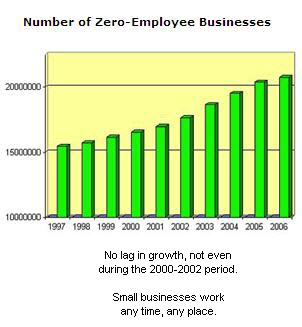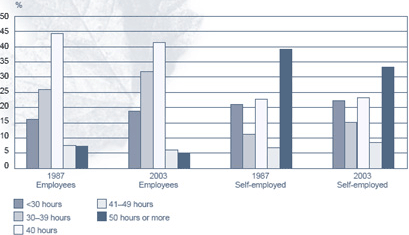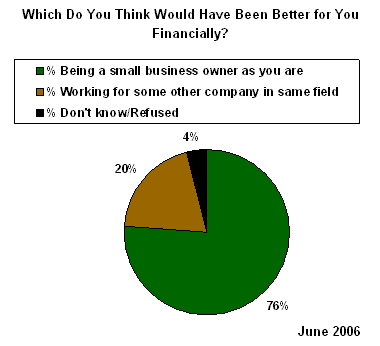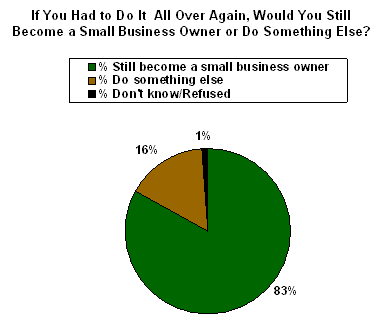Tell someone you’re starting a business, then brace yourself for their overwhelming show of support:
Wow, 95% of all businesses fail, right? That’s scary.
Most businesses are never profitable and fail within 5 years. That’s mind-blowingly depressing. Aren’t you worried about all the time and money you’ll lose?
So many businesses end in bankruptcy. Aren’t you worried about that wrecking your life?
I don’t think that’s a good move in this economy. (Right Dale?)
Well actually, these “well-known facts” are crap.
 For example, let’s examine that 95% failure rate. The United States Department of Labor reports that the number of business that terminate within four years is just 24%. And for only 17% of those, “termination” meant failure or bankruptcy — the majority were businesses that were sold or the owner retired.
For example, let’s examine that 95% failure rate. The United States Department of Labor reports that the number of business that terminate within four years is just 24%. And for only 17% of those, “termination” meant failure or bankruptcy — the majority were businesses that were sold or the owner retired.
Sure starting a business is riskier than a job, but these proclamations imply that only an ignorant, greedy, egomaniac would be crazy enough to run into the arms of almost certain failure.
If you’re thinking about starting a new venture right now, you need to understand the risks, but you need the real risks. The truth (as always) lies between these baseless off-hand remarks and those startup blogs that show only the rosy side of things.
First — and bare with me on the pedantry — you have to define “business.” The 2006 US Census [1] shows that half of all “businesses” are a secondary income source, not the primary. More than two-thirds of businesses are started at home; only 21% of all businesses employ someone other than the owner. In other words, most “businesses” are side-projects that the owners might or might not hope will grow into something more.
Not that there’s anything wrong with a side-project! But data about “side projects” isn’t relevant if you’re talking about taking the Big Leap (quitting your job). After all, aren’t side-projects more likely to fail than projects you put all your energy and time and heart and soul into?
Yes, depending on how you define “fail.” An Australian study [2] found that 64% of business fail within ten years if you define “business failure” as “discontinuance of ownership.” But that can mean anything — even if the founder just loses interest which, if you have a home-based business that isn’t your primary income source, could very well be the case.
In the same study, if you define “business failure” as “bankruptcy,” the 10-year failure rate drops to a mere 5.3%! In other words, even when it’s clear that the business isn’t working, bankruptcy is rarely necessary.
What about those long hours you hear about?

Well, that one is true. Every self-employed person I know (myself included) works more than employees (except in those brutal professional sectors like medical services, legal services, and accounting).
Hard numbers: The Canadian government reports that self-employed people work 5 hours more per week than employees. But the real story is this: 33% of self-employed people work over 50 hours, compared to only 5% of employees.
What about making money? NFIB studies routinely report that one-third of all businesses are profitable, one-third are break-even, and one-third lose money.
So here we find some sobering facts. “Losing money” is pretty bad — even being jobless is better than bleeding cash — and “breaking even” isn’t much better. This is real risk, and on top of this I’ll add that you won’t be making money for the first 6-24 months. You need enough money to starve for a while, you have to set financial boundaries for yourself, and you have to walk away if you hit your limits.
However, remember that half of those business are being run part-time. “Hobby” businesses are popular; the fact that someone’s back-room bead-stringing “business” loses money isn’t relevant if you’re thinking about becoming a consultant.
Anyway the real question isn’t “How much money do I expect to gain or lose from running a business?” Rather, it’s “How much money do I expect to gain or lose from running a business compared to my next-best alternative?”
For most people, “next-best” means a job. In a 2006 Gallup survey [3] when small businesses were getting slammed with high gas prices, business owners reported four to one that they make more money per hour than working for another company in the same field. That’s profits, y’all, not revenue. And that’s even with the extra hours small businesses demand.
Furthermore, half of those owners reported that they were earning more through the business than they would have in a regular job, and 76% said they’re better off financially in general:

The US census backs up the “feelings” of these entrepreneurs [4]: In every year between 1990 and 2004, the biggest salaries came from companies with 0-4 employees and companies with more than 500 employees. So if you’re happy slogging it out at a big company, wondering when you might get laid off or have your job shipped overseas, then that’s your best bet at a monthly paycheck. If that doesn’t sound good, tiny companies are the way to go.
But then there’s the economy. Why does everyone think starting a business in a down economy is bad?
Is it because you think no one’s spending money? It doesn’t matter: In your first 6-12 months you won’t have many customers anyway, and those you do get are the most desperate for your product or service. If they’re desperate, it doesn’t matter what the economy is doing.
In fact a bad economy is perfect. Every vendor is hurting: get cheap furniture, cheap rent, cheap advertising, cheap services like art and web design. Good people are out of work; all the better to get help at half-price or a co-founder who just got laid off.
At Smart Bear we just hired a design consultant for 1/3rd of his usual rate. Advertising vendors are dropping their prices without me even asking. Subleases are everywhere as companies try to recoup the cost of their seven-year lease now that they’ve laid off half their staff. It’s prime time to get stuff at low cost.
Here are six reasons to start up in a bad economy. Here’s six more.
But in the end, the real question is one of fulfillment and happiness, not merely of financial success. With a regular job, “happiness” and “money” tend to be inversely related — it’s hard to have both. This is summarized neatly by Juhan Sonin‘s evaluation of his own life:

Running your own business may be the way to break the pattern — both making money and doing what you love — but small business is stressful and difficult and scary. Is it worth it?
To answer, I’ll leave you with this chart from the Gallup [3] poll:

Hey small business readers! How about sharing your own words of encouragement with other readers of this blog! Inspiring words are great when you’re overwhelmed. Leave a comment!
References:
[1] US Census, 2006 survey of business owners. Data here.
[2] John Watson and Jim E. Everett in Journal of Small Business Management, October 1996
[3] Gallup News Service, 2006 Smart Business Index poll. Came to my attention via the the Corporateprenuer blog
[4] US Census Statistical Abstract 2008 Table 0737. Data via infochimps.org.
35 responses to “Starting a business isn’t as crazy and risky as they say”
You know, I saw a billboard out here that said "Bill Gates started Microsoft in a recession."
What I usually tell myself when I’m told that XXX% of all business fail, is "OK. So how many do I hafta start until I hit one that succeeds?" That’s why starting a bunch of small projects is great. Just know you’re gonna fail a few times, so plan for it by making sure you have the resources to start a bunch of failed businesses.
Also to help me out, I figure since I’m learning and reading stuff like this blog, my probability of success goes up… many people jump in clueless, so I like to think I’m on the other side of the bell curve.
On our blog Tom talks about a brand new venture that they’ve never done before… they figure if even if they fail, they will learn a ton without spending a lot of money.
The one thing i think is when I am employed, I am working for me and my owners income, and when I am employer I work and get other to work for my Income.
Hey – thanks for this post. As it happens, my fiancee and I are currently considering the benefits of self-employment over a regular salary and these facts are very eye-opening. Cheers!
@Dale — You’re definitely on the right side of the bell curve.
@Ashish — I’m not sure about defining a business as "getting others to work for my income." As the owner, you’ll be the first to arrive, the last to leave, the last to get paid, the first to receive stress and worry.
@Nick — I wish you success! Let me know if you decide to take the plunge — always fun to hear about new ventures.
I agree completely. I remember reading that 95% failure rate is extremely misleading — I think it’s generally there to mislead people.
I wish more news organizations and books would use these numbers instead of fear mongering to 95%.
I’m glad I came across Michael Gerber’s book about the "The E-Myth" — it’s helped me to plan possible issues and how to overcome them.
IMHO – I think small businesses are the future. They can adapt faster, are better motivated and most if not all are owner run — as opposed to large businesses which find it more difficult to change and adapt.
– Sam
Thank you for another great post Jason.
I always felt that the statistics batted about must be skewed. Thank you for taking the time to uncover some of the real numbers.
I’ve been wanting to quit the day job and work full time on my projects but fear of not making any money (not fear of "failure") has been weighing on my mind a lot. But I keep telling myself that the more time and effort I put into making it work, the closer I get to making it work.
In other words, although it makes more sense financially to start a business on evenings and weekends, I think you’ve got more chance of making it work (and therefore making money, which comes in handy) if you quit your job and work 24/7 on making it work.
My 2¢ anyway.
@Sam — glad to hear more confirmation on the data. I agree with you that small businesses are the future.
@David — You’re exactly right. Working is safer and it’s not the "wrong" choice, but I don’t know anyone whose business really got started until they took the real plunge. Scary though, no doubt about it, and no shame in that either. I’ll be writing more on exactly this subject in the near future; thanks for the inspiration.
[Editor’s Note: This is fraudulent and I’ll be posting about it in the near future.]
Sorry to have to post this on your comment for this article, but I couldn’t find your contact info on your site. I am a fellow blogger and found some of my articles plagiarized on this site, and I also found your article as well. There might be others, but thought you might like to know (if you didnt already), take a look: [URL Redacted]
Don’t worry. We don’t believe that previous poster who claims this article was plagiarized. It is clear that _he_ is the one who plagiarized you. The article posted directly after yours on his site is found here:
http://ezinearticles.com/?What-Are-the-Cons-of-Using-a-Debt-Consolidation-Service?&id=2333847
and that article was posted on May 11 at this link, whereas on his site it was posted on May 15. It is clear that this is how he runs his site. I encourage any readers to not visit the link from the previous comment, as his currently ‘most viewed’ page has only 8 views, and any further views would only encourage him.
Thank you for the solid content on this site. That is the reason why your site is successful.
Some of those stats are scary for sure, but at the same time its essential to understand the risks. Im currently in the early stages of starting my own business and am documenting my progress on my blog….. take a look…. http://milliondollarquestion-mikeyb.blogspot.com/
@John — That was stupid. You not only copied my article verbatim, you had the temerity to post a comment claiming that I copied you!
I have a special surprise for you.
(Thanks @64 for the defense!)
@Mikeyb — Thanks for the link, and congrats on starting your venture.
Your post on "Characteristics of a millionaire" is interesting. As one myself, though, you might take heart in the fact that I don’t have the following attributes: 1, 3, 5, 7, 8, 13. The rest are spot-on!
Of course this isn’t a critique of your list — everyone is different!
On of the reasons why I like your post, Jason, is that you make the difference between owning a small business and trying to market a hobby. Which is tremendously important. There’s one thing to breathe your business idea, to believe in it and afford to have crazy brilliant ideas put to a test. And there’s another to think about your business maybe one hour a day, after you come back from work, or in weekends.
I am not saying that that is not possible. What your business needs is your attention. It has to be up there in the priorities list, you have to like it and to like yourself doing it.
Nice post. (As expected by now.)
One very interesting statistic I once saw was that of the 95% of small businesses that "fail" only a small portion of those were financially insolvent. In other words, the owners "bailed" because they decided to either start ANOTHER business ( a.k.a. RESET…. using the information they learned from the first"failed" business to create a "better" business) or because they decided that being a business owner wasn’t for them.
Starting and running a small business is stressful and difficult and scary. It will test you in ways you never imagined and provide you with an education that mere money can not buy.
Amen – Amen – Amen – to your post – as always!!!
Thank you Jason for a well thought out and well written (not the same thing!) post. Like many I’ve been considering launching my own business and this kind of thoughtful encouragement is a much needed counterpoint to the normal statistics. Looking forward to your next post…
"I have a special surprise for you."
Jason –
You better be careful, you’ll have me quitting my job in no time.
Keep at it. :)
Cheers,
Ryan
Great post Jason. I’ll give you the benefit of the doubt that it is original material, except of course all the statistics you cited and credited.
I’ve frequently considered going out on my own, but was deterred by a lot of the misinformation that you debunked in this post. I appreciate the first hand perspective of an entrepreneur who had the guts to go out on their own, find a niche and fill it.
So small business owners work on average 5 hours per week more than employees? Hmm, if I quit and start my own business based largely at home, I’ll save 15 hours of commuting per week. I’ll be quids in!
@Rob — You say that jokingly, but think about that statement again. You’re spending two entire on-task days in your car. If you were working during that time you’d be working the equivalent of 7 days a week instead of 5.
Also note that business owners work more hours…. and possibly from home, meaning more on-task hours than you are currently doing.
But yeah, it’s easy to underestimate how much a commute eats away at your time.
"bare with me on the pedantry"
Thanks, that made my day!
Nice to hear the positive side of starting your own business. I started my two businesses in December 2008 and I love it. It can be hard at times but I have never learned so much in such a short space of time. I am much more driven and determined than ever. I am making a documentary of the journery from day 1 to share with others. It will be released on 4th July this year. Thanks again for an encouraging post. Claire
Thanks for this nice, positive article. I think everyone should remember that there are lots of free services and tools available these days to help promote your small business and reach the right audience. For my small business, I’ve found places like AdWido.com especially excellent.
Thanks for sharing great information!!!!.
Nowadays many of the people are doing small business. Small businesses are common in all countries.Small businesses are depending on the economic system. By this recession problem, many of the people like to do small business. Small businesses are used for people to overcome the recession problem. Your information will be useful to all small business people to improve their business.
@Claire — A documentary sounds fun. It’s after July 4 now…. is it ready? If so please post a comment so we can all check it out!
I’m form South Africa and I have found your blog on google and read a few of your other posts. I just added you to my Google News Reader. Look forward to reading more from you in the future. If you want you are more then welcome to visit my website by Googling (Mortgage Plus cc). Keep up the good work.
Tx
Morne Prinsloo
It’s sad but true. And most family members don’t really support entrepreneurs like they need to be supported. But if an entrepreneur is passionate enough, not even that will stop him or her. They will keep pushing and promoting their biz.
The best and most reliable home based business idea is one for which you feel the most comfortable with and are passionate about. The business idea must match your interests, so that you will enjoy working on it consistently. It also must be suited to your skills and experience.
Great post, thanks! I would like to share my story… I have always been one of those Corporatepreneurs or whatever you call them. I have been working on side projects since I can remember and hoping that one day I’ll just have enough clients to support my business and family without a regular job.
Earlier this year I was "forced" to test myself, I was layoff and since around May I have been working on my own projects. The problem is, after 4 months I am not too confident about continuing without a job, without being an employee and earning a check. It is hard to concentrate in my work and company when I have to worry about paying my mortgage and bills every month, and I know this is what entrepreneurship is all about, however it is a lot harder once you have a mortgage and kids. I really want to get my micro-isv off the ground, but I spent most of my time in consulting gigs just to get by and when I finally sit down to start working in my little software product… I am seriously very tired and usually get distracted doing something else. I guess I am going back to corporate America, or maybe not… I’ll just see what happens in the next month or so.
I am very motivated and believe have a lot of energy… but after these 4 months I have come to realize it is really crazy and risky to start a business, because it is. However, I am a crazy guy, I welcome risk and even do I enjoy the uncertainty of things… I still have a family who don’t need to share my craziness and a mortgage to pay… so wish me good luck, I’ll keep trying even if I fail this time =)
@Ricardo — Thanks for sharing your story! You’re right, of course there’s risk, but taking a calculated risk is not in itself crazy! Risking downside without upside is crazy. Risking when the probability of success is very small is crazy. But deciding that it’s a good risk is not crazy.
New business is quite scary I work for startups and now self employed and it is hard but you learn more about business and your career this way. If you work for an establish company with large corporate structure you are not that important and its a big ladder to climb but if you are at a startup you usually wear many hats.
I am just starting out, well actually I have had my business idea for 2 years and it has taken me that long to get it going. I still am waiting for my product from China. They sent me a sample of the product they said they could make, in this case boots. I ordered that product and guess what they made me some horrible boot in it’s place.They got all my money too. I am still negotiating with them to work this out. I feel like all I am doing is climbing up hill and money is just flowing out of my pockets and I have nothing to show for it. Is starting a business always uphill or will there be a point where I can coast?
Any help or thoughts would be appreciated?
You never get to coast I’m afraid. There’s never less work, just different work. Yes, even when you hire people to do some of the work, more work appears.
For China production in particular, everyone I know says you have to physically go over there or it doesn’t work. Also apparently most of them are rip-offs; you have to either have a hot tip or try a bunch to find the ones who aren’t. :-(